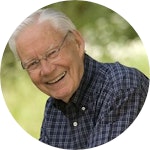I recently conducted the funeral of a man who lived just five short months after being told he had inoperable lung cancer. During those five months Peter’s body deteriorated, but his soul grew immensely. While he was well, he loved to take care of his family. When he was sick, they took wonderful care of him at home.
He contemplated life during those five months, and during that time both the seen and unseen worlds came into focus. He was not a churchman during his lifetime, but Christ became so real to him at the end that he could say to his best friend, “I’ll see you up there,” before he died in peace.
One of my own relatives was recently baptized at 69 years of age only three weeks after his wife died because he perceived that he wouldn’t go where his “honey” had gone if he didn’t. He had thought about it for a year, but her prodding “after death” awareness brought him to that sudden moment — while he was paying bills — when he saw everything whole. In front of a rather “staid” congregation he confessed Jesus Christ and was baptized. After the baptism, he said in a loud voice, “Yes! Yes!” and the congregation responded with a ringing clap.
The Ongoing Dialogue
Philip Nary was the late sixteenth-century Italian saint whose inner joy and humor drew all classes and types of people to him for counsel.
One day Nary was visited by a student of philosophy who was full of himself, bubbling with ambitious plans for his life. Like the wise counselor that he was, Nary restricted his part of the conversation to an occasional question. The student hurried on to tell Nary that he was now engaged in getting his Ph.D. in philosophy. “What then?” Philip asked. Then he would go on to get a doctorate in both civil and common law. He’d inherit his family’s large estate and would marry brilliantly and have a fine family of his own. “What then?” Well, then he would win a name for himself in the courts and he’d achieve many honors, perhaps even be elected an auditor. “What then?” the old counselor/saint continued to ask him. Well, then he supposed he’d grow old surrounded by an illustrious family and die like everyone else. And, Philip Nary asked once more, “What then?”
Within each and every one of us resides both the voice of the court philosopher and the questioning voice of the counselor/saint. When we become truly aware, there is something within us that asks these same questions about all we do and about the very direction our life is taking. There is in all human beings who have not been robbed of their birthright an interior dialogue, an inner conversation that never ceases. Sometimes this conversation is buried beneath the threshold of consciousness for weeks or months or even years.
But then, like the ancient limerick about the “old man from Peru who dreamt he was eating his shoe. He woke in the night with a terrible fright and found it was perfectly true,” a person can be startled out of his dark dream-like tunnel and discover that the dialogue is going on. Maybe it comes during an illness (as in Peter’s case) or a crushing humiliation or a loss (as in the case of my relative) or a radical change. Or it can come through worship or prayer. Contemplation comes in various forms and degrees and is brought about in innumerable ways and at any variety of times.
Sometimes people are ravished by some beautiful scene. Our family visited Banff, Canada, a few years ago. I was simply overwhelmed by the breathtaking view of Lake Louise, so much so that I could only hold my breath.
Great heroic acts deeply touch some people, while moving friendships or deep loves touch others. The best male friend I have ever had in this life was a man named Joe. He was everything a person would ever want in a friend — caring, accepting, generous, open, honest, and faithful. He once said to me about God, not meaning to sound haughty at all, just truthful: “You know, Willy, I know, you just believe.” I wasn’t offended. He had seen something I had not seen. He had contemplated life at a deeper level than I because he was dying of leukemia.
When this happens and the dialogue within is recovered; when the amazing sanctuary of the soul is discovered and the only place within, the God place, becomes clearly present; then, despite its having been ignored, everything changes — things that were important become unimportant and unimportant things become of primary importance. This strange and mysteriously awesome power enables us to carry on this inner questioning about “Who are we?”, “Where did we come from?”, and “What then?” This power penetrates the inner connections of our experiences in a meaningful way, and our life and the work of our hands and brains relate to what our knowledge and experience have communicated to us about the world we live in. This power is the power of contemplation.
A Penetrating Gaze at the Truth
Contemplation comes from optical language and means to gaze steadily at something; to look at it calmly and continuously, attentively and searchingly. Thomas Aquinas describes contemplation as a simple, unimpeded, penetrating gaze at the truth.
I am reminded of a scene I saw yesterday: a cat sat face-to-face one foot away from a huge frog, each staring at the other, that is, until I grabbed the cat and the frog leaped to safety. I think they both knew the reality of the situation in the animal kingdom.
Somehow we recognize that we are confronted by a given that is not us. We are not identical with it. There is a cleft between the contemplator and the contemplated. All contemplation acknowledges this cleft. Even our past can never be fully identified with the eye that examines it.
In all Christian worship there is a sense of awe, reverence, and mystery. Adoration is the only appropriate response of a human being before the source of all being. God is other than me. He is totally other and yet chooses to be both transcendent and immanent. That God, in Jesus Christ, spent his first days in a manger in a stable is awesome. More awesome still is that he comes to live in a sinful human heart, creating the Body of Christ on earth.
At the physical level of contemplation not much personal involvement is necessary as, for example, in scientific observation. At the personal, ethical level (as well as all social levels) a higher response is needed by the contemplator. But the price to be paid by the contemplator at the deepest level — religious faith — is extremely high, involving total participation, total surrender, total involvement.
In the Midst of Intense Activity
In the popular mind contemplation is often associated with leisure. Being relaxed in a lawn chair with eyes closed is a modern, idyllic picture of contemplation. In the study alone or walking in the woods holding the hand of someone you love is another picture of rhapsodic contemplation. While there is no denying that contemplation is naturally associated with a certain holy leisure, it can also take place on a bus, in the kitchen, in traffic jams, in a busy office, even at mealtime. True contemplation is an inward openness to the meaning of things. I know a man who I think contemplates all the time. Usually it is better to have certain times and places to contemplate, but it need not be that limited.
Contemplation can even take place during intense activity. One person I know contemplates constantly as she pulls weeds in her lovely garden. The work of contemplation is to sort out the activities, frame them, weigh them, and evaluate them. I have known some extremely busy people who did not neglect contemplation but constantly carried it on at a low intensity.
Possible for All
Not everyone is as gifted in contemplation as others, but I am aware of no evidence that certain psychological types or temperaments are more gifted and will always be able to contemplate. There are no rules that say only specialists can contemplate. It is nonsense to believe so. Ordinary contemplation is possible for anyone. Without it, people are not wholly conscious or wholly alive. Even so great an authority as Evelyn Underhill says that “The spring of the amazing energy which enables the great mystic to rise to freedom is latent in all of us.” It is an integral part of our humanity.
In desperation have you ever looked into the abyss of your own life; or in depression or in humiliation or in search of God? Pascal says, “The infinite abyss can only be filled by an infinite and immutable object — only God Himself.”
Our society today is haunted by the absence of contemplation. The Church is awakening to it, but we still don’t know how to use this God-given power of relating and assimilating the experiences of work, worship, family, community, and world. It is the genius of contemplation to apprehend unity, to pierce through the surface, and to discover what holds things together underneath. I have come to see “as through the fog dimly” that in Jesus Christ “all things are held together” and in him all things have unity and meaning.
The deepest level of contemplation and the greatest gift God has given us humans through his Holy Spirit is that of being able to contemplate the living God in Jesus Christ through prayer. Prayer is that attentiveness to God and its subsequent obedience.
Original publish date unknown.
Photo by Bradley Dunn on Unsplash
Text First Published December 1998 · Last Featured on Renovare.org November 2023


